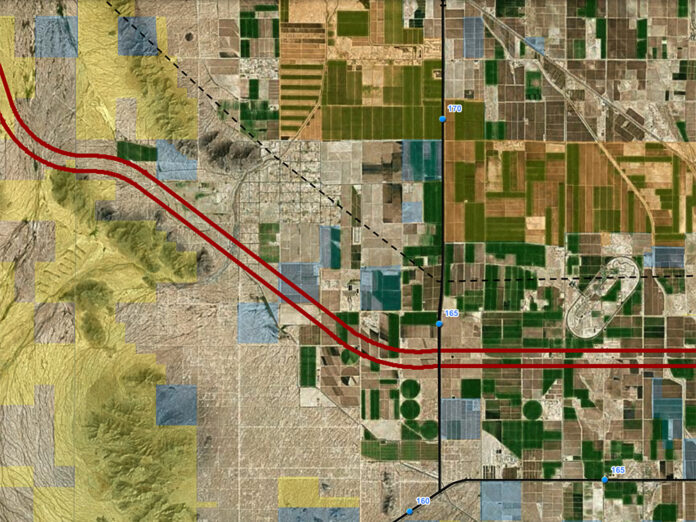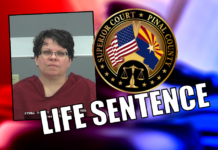
The fight against the planned route of Interstate 11 is headed to court.
Four Tucson-area conservation groups filed suit Thursday against the Federal Highway Administration (FHWA), challenging its approval of the proposed 280-mile-long highway that would link Nogales and Wickenburg. As planned, I-11 will be routed around the west side of Tucson, head north through Casa Grande then cut through Hidden Valley to west of the Palo Verde Mountains.
In their lawsuit, filed in U.S. District Court in Tucson, the conservation groups claim the highway, as routed, will destroy “pristine Sonoran Desert,” exacerbate air pollution and endanger wildlife, including the “threatened” Sonoran Desert tortoise. (In February, the U.S. Fish and Wildlife Service ruled the tortoise is not in need of protection under the federal Endangered Species Act, citing a stable population.)
Co-locating I-11 with Interstates 10 and 19 would have reduced those effects, the lawsuit contends.
The lawsuit contends the FHWA failed to consider other transportation alternatives, including a rail line, and “sidestepped the required environmental review” before approving the project.
“This is a road to climate catastrophe. It’s despicable to see state and federal officials playing into the hands of private developers and ignoring the climate emergency to approve this boondoggle,” said Wendy Park, a senior attorney at the Center for Biological Diversity, in a news release. “Our precious desert wildlands should be off limits to this scale of destruction to give animals like the desert tortoise a fighting chance of surviving climate change. This unnecessary highway will mean more roadkill, fragmented wildlife populations, and more climate pollution.”
By postponing an environmental review or deciding between two route options in Pima County, “both of which would harm wildlife, public lands, and air quality and exacerbate the climate emergency,” the lawsuit claims the “approve now, study later” approach violated federal law.
“This is an egregious assault on 100 years of efforts by local, state and federal land agencies to protect important desert lands forever, for species to survive and move through the landscape,” said Carolyn Campbell of the Coalition for Sonoran Desert Protection in a statement. “There is overwhelming opposition by residents, tribal entities, public agencies and elected officials here in the Tucson area and we won’t stop until we’ve blocked this destructive and unneeded freeway that will harm our wildlands and wildlife.”
A spokesman for the federal agency told the Capitol News Service it does not comment on pending litigation.
Some current and former Maricopa officials have lent support for the I-11 project.
Christian Price, the current mayor, and Anthony Smith, the former Pinal County supervisor and Maricopa mayor, have expressed support for the preferred alternative route that would sweep through the city’s planning area.
But some residents oppose the track through Hidden Valley, saying a number of homes will be taken by eminent domain.
In 2019, Republican state Rep. Mark Finchem told InMaricopa he wanted to see the process slow down.
“I’ll be the first one to disclose that I’m at odds with the Pinal County supervisors and some folks that are elected officials in the (City of) Maricopa,” Finchem said at the time. “They see economic development for an expressway coming up. Well, maybe.”
Construction of the freeway is likely decades away.
The FHWA Tier 1 approval delineates a path 2,000 feet wide. Tier 2, which would further refine the I-11 corridor to a maximum 400-foot-wide alignment, would likely take another decade, at least. As of November, there was no funding for the necessary Tier 2 studies to be undertaken by the Arizona Department of Transportation.







![MHS G.O.A.T. a ‘rookie sleeper’ in NFL draft Arizona Wildcats wide receiver Jacob Cowing speaks to the press after a practice Aug. 11, 2023. [Bryan Mordt]](https://www.inmaricopa.com/wp-content/uploads/2024/04/cowing-overlay-3-218x150.png)




![Alleged car thief released without charges Phoenix police stop a stolen vehicle on April 20, 2024. [Facebook]](https://www.inmaricopa.com/wp-content/uploads/2024/04/IMG_5040-218x150.jpg)




